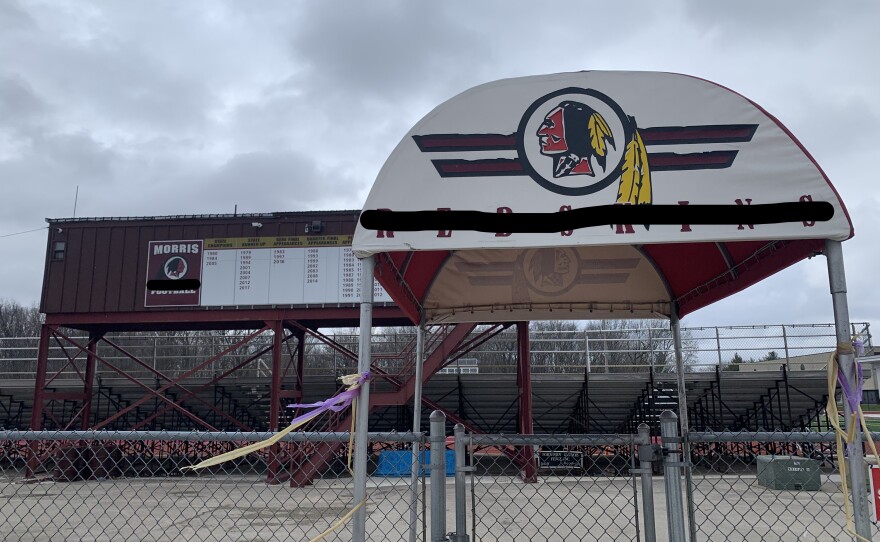On a spring night in 2021, the Friday night lights are bright in Morris. A massive banner on the school right next to the football stadium reads “Morris Football: Pride, Integrity, Tradition.”
Right next to the sign, fans pour in through a gate adorned with a cartoon of a native person’s face, above a name. It’s the same as the former name of the Washington pro football team. Because it’s considered offensive, we’ll refer to it as “R-skins.” Cars in the parking lot have stickers with bold letters saying “R-skin Country.”
Just before the football game, the Morris “R-skins” marching band takes the field led by a teenage girl wearing face paint and what is supposed to be a native headdress and garb. The girl’s parents are the mayor of Morris and a member of the school board.
In January, that school board voted to remove the “R-skins” mascot over the course of several years. Ted Trujillo was the only native person on Morris’ recent mascot committee that recommended the action. The Morris resident is a registered member of the Passamaquoddy tribe. He says he’s been trying to get the school to change its name since he went there in the 1980s.
The committee was tasked with providing the school board a report on whether they should change the nickname. They brought in research from the American Psychological Association about the harm caused by native mascots.
“These mascots create a hostile learning environment for Native youth. It instills prejudices against natives in non-native youth,” Trujillo said. “It's also tied into other issues with natives like the high suicide rate. It diminishes self-esteem when native youth see their traditions and customs that they've always held sacred being mocked and used for nothing but entertainment.”
The committee dug into the history of the word “r-skin.” It was used to refer to native skin color and the scalps of natives turned in for bounties. They came to the conclusion that the word is a racial slur and its use should not only be retired at the school but also that use of the word is a violation of the student handbook that prohibits derogatory slurs.
Even though the board voted to change the mascot by 2025, Trujillo says he’s concerned that future board members will reverse the decision.
Just 15 minutes from Morris, the Minooka Indians are also reconsidering their native mascot.
Julie Dye is a Potawatomi activist and educator. She says when schools have native mascots, it’s not just harmful to their students. It spreads to other schools they interact with. Opposing fans at a recent Minooka sports game held up “scalp the ‘r-skins’” signs.
John Kane, a member of the Mohawk tribe, is a radio host and native educator. He was asked by Minooka to give a presentation to their board’s committee and answer questions.
For Kane, it’s pretty simple, “We are not your mascots.” The most common defense Kane hears from schools seeking to preserve their mascot is that it’s meant to honor natives.
“It's not just not true because we aren’t honored. But the reality is, we were never considered as a people when they chose those mascots. They created these images,” he said. “They recreate the characteristics not because they represent us, but because they want those characteristics to represent them, likening football to some sort of battlefield.”

Kane points out that hundreds of native tribal nations have passed resolutions opposing native mascots. Hundreds of schools have chosen to move away from those mascots.
One thing that confuses Kane the most is that these are schools, places of education.
“You would think that a school's responsibility should be to teach fairness and to break down these stereotypical images that are cast on people. But that's not what these schools are doing. They are promoting a stereotype,” said Kane.
He says you don’t see mascots of other ethnic groups used as Friday night entertainment.
Minooka has not yet decided whether to retire the Indian mascot. They did change the name of their school newspaper from “Peace Pipe Chatter” to “Nook News” and say they’re considering changing the name of their at-risk student program now called “Project Indian.”
In 2019, Maine became the first state to ban the use of indigenous mascots. In Illinois, state Rep. Maurice West of Rockford introduced legislation that would have required schools to get permission from a tribe within 500 miles to use a native mascot. They also would have to offer a course on “Native American contributions to society.”
West says that bill has been sidelined for now in favor of one proposing a Native American curriculum for the state’s schools.
That plan was shelved in committee this spring, but West says this summer he’s putting together a working group of advocates -- including federally-recognized tribe members -- to help craft the bill.
“Our name alone is from a Native American tribe,” said the Rockford Democrat. “So, if any state in this union should really appreciate and celebrate our Native American brothers and sisters, it should be Illinois.”
Native educators like Julie Dye and John Kane say more education could be good, but they’re skeptical. They hope the curriculum doesn’t just glorify or justify the assimilation of native people, or become a way for schools to continue using offensive native mascots.





